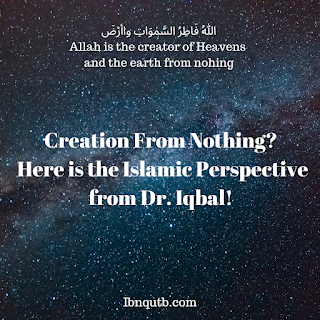The Unceasing Reward of Man
(From Allama Iqbal)
The ‘unceasing reward’ of man in Qur'an consists in his gradual growth in self-possession, in uniqueness, and intensity of his activity in controlling all that comes to him to divert him away from the right path. This does not mean that you give up this world. In fact, the path to Jannah leads through this world. All Sahaba, who probably achieved this focus had their own businesses, they fought in battles when needed, and had families. The idea is to control yourself so you are on the right path always even while going through the daily routines and actions and always be conscious of nearness of Allah Subhanahu wa Ta'ala.
Even the scene of ‘Universal Destruction’, what we call the day of judgement or Qayamah, immediately preceding the Day of Judgement cannot affect the perfect calm of a full-grown ego:
‘And there shall be a blast on the trumpet, and all who are in the heavens and all who are in the earth shall faint away, save those in whose case God wills otherwise’ (39:68).
Who can be the subject of this exception but those in whom the ego has reached the very highest point of intensity? This means the one who was always God-conscious and always staying away from the wrongs and achieves total control of his actions.
***
Muslim Contributions
The 1903 Nobel Prize in Physics winner, the French physician Pierre Curie, says "we splatted the atom only with the 30 books left us from Andalusia. If we could have the chance to examine the hundreds of thousands of books, which had been burned by Hulagu Khan [The Mongol ruler that burned the very books of the Islamic civilization], we would be now playing football between the galaxies."
Roger Bacon’s conceptions of science are more just and clear than those of his celebrated namesake. And where did Roger Bacon receive his scientific training? - In the Muslim universities of Spain. Indeed, Part V of his Opus Majus which is devoted to ‘Perspective’ is practically a copy of Ibn Haitham’s Optics.
***
Creation From Nothing? Here is the Islamic Perspective
Physics:
How did the particles called Quraks (the building blocks of protons and neutrons) and other short-lived elementary particles come to exist in the first place? Quantum
field theory tells us that even a vacuum, supposedly corresponding to
empty spacetime, is full of physical activity in the form of energy
fluctuations. These fluctuations can give rise to particles popping out,
only to disappear shortly after. This may sound like a mathematical
quirk rather than real physics, but such particles have been spotted in
countless experiments.
Islam:
The essence of the atom is independent of its existence. This means that existence is a quality imposed on the atom by God. Before receiving this quality, the atom lies dormant, as it were, in the creative energy of God, and its existence means nothing more than Divine energy become visible. The atom in its essence, therefore, has no magnitude; it has its position which does not involve space.
***
Are we waiting for Mahdi to help us?
Is coming of Mahdi prediction authentic? Here are Allama Iqbal and ibn Khaldun:
Allama Iqbal states that, according to his firm belief (aqeedah), all traditions relating to mahdi, masihiyat and mujaddidiyat are the product of Persian and non-Arab imagination; and he adds that certainly they have nothing to do with the true spirit of the Qur’an.
Ibn Khaldun recounts formally twenty-four traditions bearing upon the belief in Mahdi (none of which is from Bukhari or Muslim) and questions the authenticity of them all.
***








Comments